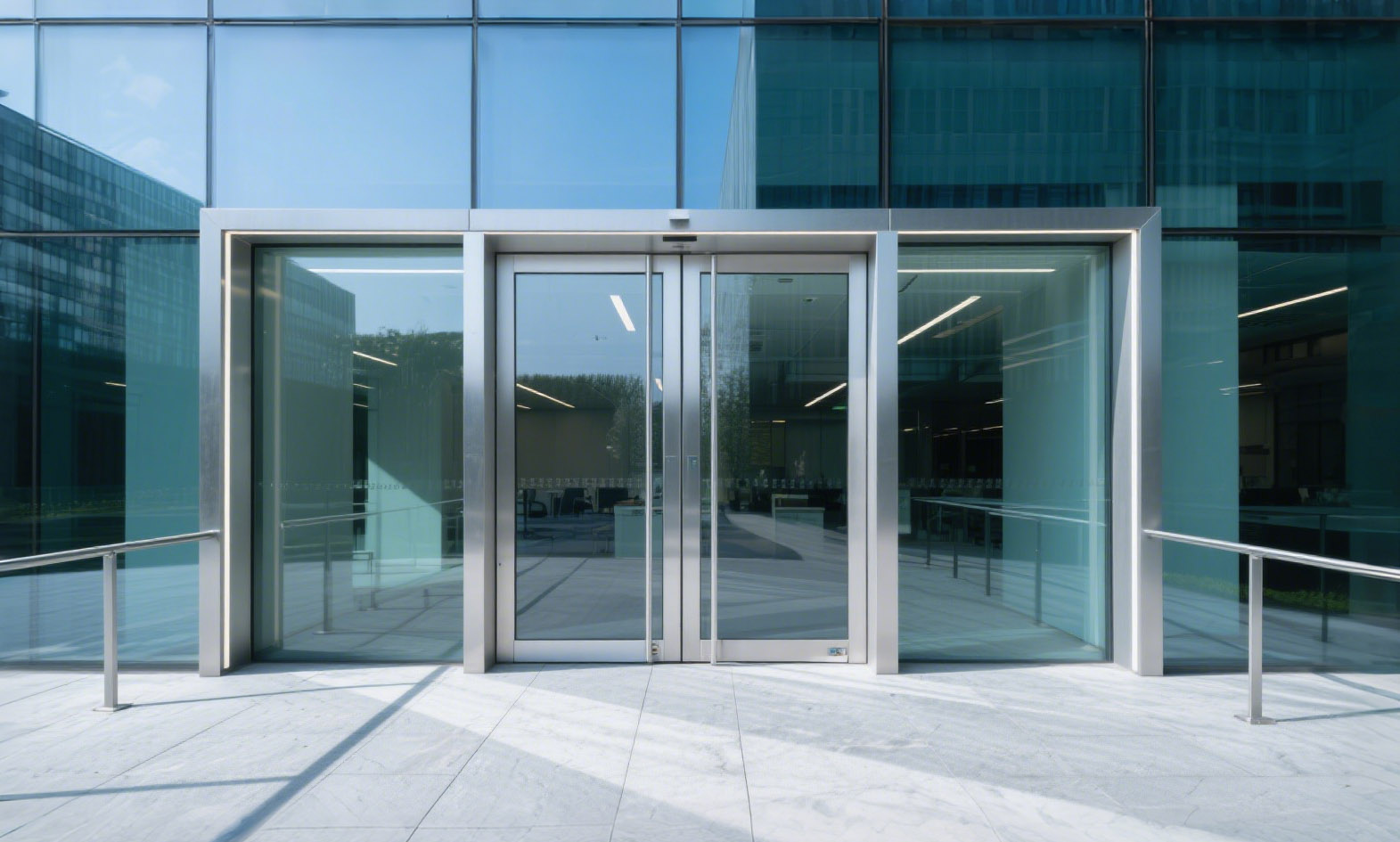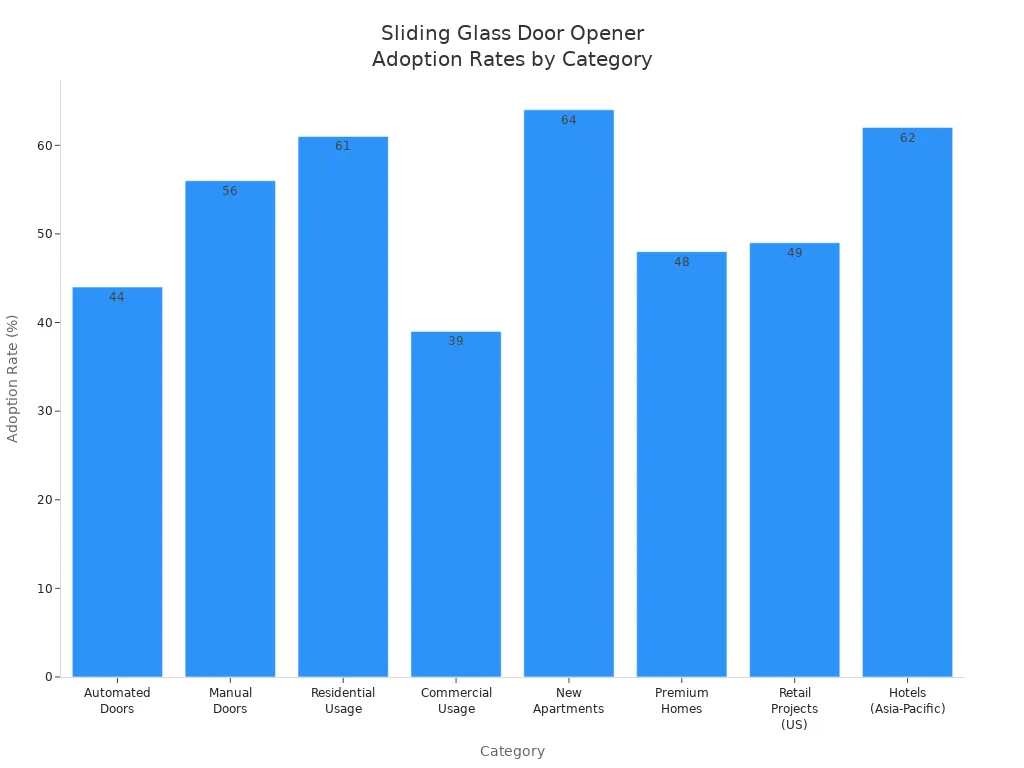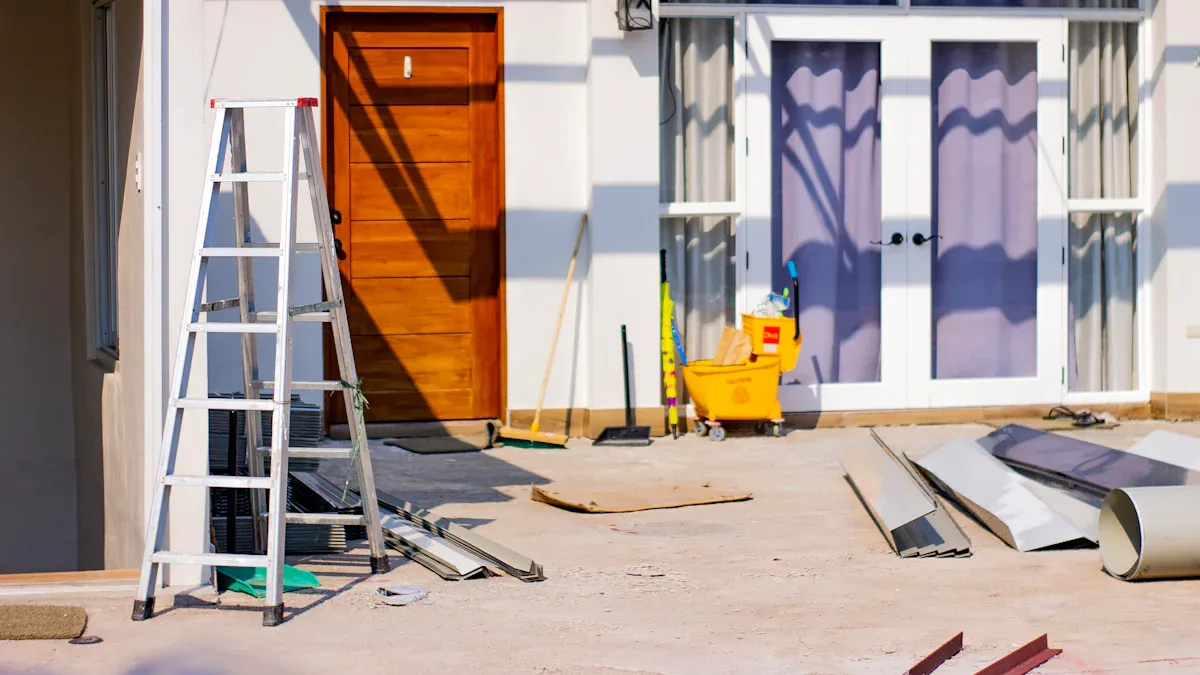
Sliding Glass Door Openers create seamless entry for homes and businesses in 2025. Over 44% of new sliding glass door installations now use automation, reflecting strong demand for hands-free access and safety.
| Category | Statistic / Insight |
|---|---|
| Automated Doors | Account for over 44% of recent global sliding glass door installations (2024-2025). |
| Manual Doors | Represent approximately 56% of total installations globally in 2024, favored in cost-sensitive regions. |
| Residential Usage | 61% of sliding door installations in 2024 were in residential projects. |
| Commercial Usage | 39% of installations in 2024 were in commercial projects (offices, malls, hotels). |

Key Takeaways
- Automatic sliding glass door openers improve safety and accessibility by using advanced sensors and hands-free operation, making entry easier for everyone, including people with disabilities.
- Smart features like biometric access, voice control, and mobile apps offer convenient and secure ways to manage doors in homes and businesses.
- These door openers save energy by sealing tightly and opening quickly, helping maintain indoor climate and reducing costs while enhancing hygiene and convenience.
Sliding Glass Door Opener Technology and Benefits

Advanced Sensor and Motor Systems
Modern sliding glass door openers use advanced sensor technology to ensure reliable and safe operation. These systems combine light beam, infrared, and radar sensors to detect obstacles and adjust to different environments. Adaptive sensitivity mechanisms help the sensors respond to changes in foot traffic and lighting. For example, the BF150 Automatic Sliding Door Operator features a slim motor and an integrated sensor system that works well in both indoor and outdoor settings. The sensors can stop the door before contact if something interrupts the light beam or enters the detection area. This technology works in a wide temperature range, making it suitable for many climates.
Motor systems have also improved. Products like the Autoslide MultiDrive and VVS 300 Glass Sliding Door Operator use motor drive belts inside sleek housings. These motors provide smooth and quiet door movement. The design reduces noise and makes the door easy to open and close. This technology allows the sliding glass door opener to fit into homes and businesses without disrupting daily life.
Tip: Customizable settings let users adjust opening and closing speeds, which can help save energy and match the needs of different spaces.
Hands-Free Convenience and Accessibility
Automatic sliding glass door openers provide hands-free operation, which is especially helpful for people with disabilities and the elderly. These doors meet ADA standards, making buildings more accessible. Users do not need to touch handles, which reduces the risk of spreading germs. In busy places like hospitals and shopping malls, hands-free doors help people carrying items, parents with strollers, and those using wheelchairs move easily.
Hands-free operation also improves independence and safety. People with limited mobility can enter and exit without help. Businesses benefit by attracting more customers and improving their public image.
- Doors open automatically with motion or pressure sensors.
- Efficient traffic flow reduces wait times and congestion.
- Sensitive sensors prevent injury or entrapment.
- Durability ensures reliable use in high-traffic areas.
- Customization and smart access control improve security and user experience.
Enhanced Safety, Security, and Hygiene
Safety is a top priority for sliding glass door openers. Motion and safety sensors detect obstacles and stop or reverse the door to prevent accidents. Security features include strong locking mechanisms, such as deadlock bolts and electronic keypad locks. Some systems use biometric access or keypads for secure entry without physical keys. Emergency release mechanisms allow manual operation during power outages, ensuring users are never trapped.
Regular maintenance keeps these safety features working properly. In healthcare and food service environments, sliding glass doors help maintain hygiene. Touchless activation and overhead sensors reduce contact points, supporting infection control. Smooth and fast door movement helps staff and patients move efficiently while keeping spaces clean.
- Doors meet clean room standards in sensitive areas.
- Privacy glass and larger openings support hygiene needs.
- Swing door operators provide safe, low-contact operation.
Energy Efficiency and Climate Control
Sliding glass door openers help maintain indoor climate and reduce energy costs. Rapid opening and closing minimize the exchange of air between inside and outside, keeping temperature and humidity stable. Hermetic sealing and drop-down gaskets prevent air leakage. Door interlock systems stop cross airflow, supporting climate control in large facilities.
Some systems, like the HVAC Smart Relay Switch, monitor open doors and pause heating or cooling if a door stays open too long. This prevents wasted energy and lowers HVAC costs. Advanced sliding door systems use perimeter seals and high-speed operation to reduce air infiltration. These features help large buildings save energy and lower their environmental impact.
- Automatic doors eliminate human error in closing, ensuring proper sealing.
- Touchless operation reduces airflow disruptions and contamination.
- Environmental benefits include reduced energy consumption and improved air quality.
Installation, Maintenance, and Real-World Applications

Professional Installation and Compatibility
Professional installation ensures that a sliding glass door opener works smoothly and safely. Installers check the alignment of tracks and rollers, making sure the door fits tightly in its frame. They use special tools to secure the opener above the door and connect the motor and sensors. Compatibility matters because different doors and frames need specific hardware. Installers match the opener to the door’s weight and size, which helps prevent problems like misalignment or incomplete closing. In commercial settings, installers also test access control features and safety sensors to meet building codes.
Maintenance for Long-Term Performance
Regular care keeps a sliding glass door opener running for many years. Most systems last 10 to 20 years with proper upkeep. Owners should follow these steps:
- Clean tracks and rollers with a vacuum and soft brush to remove dirt.
- Dry tracks before applying a silicone-based lubricant.
- Lubricate rollers every few months to reduce friction.
- Inspect weatherstripping for cracks and replace if needed.
- Adjust rollers and check alignment to prevent dragging.
- Test locks and hardware for smooth operation.
- Avoid forcing the door if it sticks; check for dirt or worn parts.
- Call a professional for complex repairs or if the door is under warranty.
Residential Use Cases for Sliding Glass Door Openers
Homeowners enjoy greater security and convenience with these systems. Doors close and lock automatically, so families do not worry about leaving them open. Access control features, such as keypads or biometric triggers, allow only trusted people inside. Hands-free operation helps when carrying groceries or for people with mobility challenges. Many openers connect to smart home systems, letting users control doors with a phone or voice command. Pet modes and quiet operation add comfort to daily life.
Commercial Applications in 2025
Businesses use sliding glass door openers in offices, hospitals, hotels, and retail stores. These doors create open, modern spaces and help control access. Hospitals benefit from touchless entry, which improves hygiene and makes movement easier for staff and patients. In retail and hospitality, automatic doors handle high foot traffic and save space by sliding instead of swinging. They also help lower energy costs by sealing tightly and opening only as needed. Many businesses report better customer experiences and smoother operations after installing these systems.
Sliding Glass Door Opener systems deliver clear benefits for homes and businesses.
- They improve safety with sensors and secure locks.
- Touchless operation boosts hygiene and accessibility.
- Automatic closing saves energy and space.
Upgrading increases property value and user satisfaction, making these doors a smart choice for 2025.
FAQ
How does an automatic sliding glass door opener work?
A motor pulls a belt attached to the door. Sensors detect movement. The system opens or closes the door smoothly and quietly.
Tip: Regular cleaning keeps the system running well.
Can automatic sliding door openers improve building security?
Yes. Many models use strong locks, keypads, or biometric access. These features help control who enters and exits a building.
Where can people install automatic sliding glass door openers?
People can install these openers in homes, offices, hotels, hospitals, and shopping malls. The system fits most sliding glass doors.
Post time: Jul-29-2025



